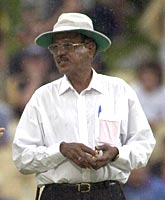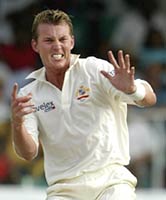Home > Cricket > Columns > Daniel Laidlaw
Sledging, continued
May 30, 2003
Sledging is undoubtedly a controversial and emotive topic. Unfortunately, this makes it inevitable that any discussion of it tends to be interpreted in the context of pre-conceived personal views. Last week's attempted explanation of why Australian cricketers sledge, prompted by a question from an Indian friend, has been misinterpreted by some as a defence of sledging, and the possible reasons behind Australia's behaviour confused with the important but altogether different issue of inconsistency in handling such behaviour by umpires and match referees.
Some clarification is necessary. Ultimately (and unless you are a determinist) all individuals are responsible for their own actions. When McGrath harangued Sarwan, he was to blame, not society. But having established that, it would be naïve to pretend that culture and society has no influence whatsoever on attitudes and behavioural patterns we see from sportsmen, particularly cricketers, on the field of play. Logically, there has to be some connection -- cricketers are people.
The purpose of last week's column was not to justify but to explain. Just because you can offer reasons (not necessarily correct ones) for why something occurs, it does not therefore follow that you approve of it. To use an extreme analogy, someone who attempts to explain the causes of terrorism is likely to be labelled by reactionary elements as an apologist for terror, when that is not necessarily the case at all.
The solution to curbing sledging almost goes without saying, and has already been commented upon (see 'Records and rancour', May 16). It is for umpires and referees to do their jobs and apply the code of conduct as it stands. The laws are quite clear. The ICC is a popular and easy target, but they are not to blame here -- the processes are in place, and it is the elite panel of officials who are failing them.
 Now that the genesis of McGrath's explosion in the fourth Australia-West Indies Test has been revealed, it is evident he should have been punished severely. That this failed to occur is the fault of two people -- umpires David Shepherd and Srinivas Venkataraghavan.
Now that the genesis of McGrath's explosion in the fourth Australia-West Indies Test has been revealed, it is evident he should have been punished severely. That this failed to occur is the fault of two people -- umpires David Shepherd and Srinivas Venkataraghavan.
It must be noted it is no longer the responsibility of the match referee to both charge and prosecute players for what occurs on the field. Laying a charge is now the duty of the umpires. Under the previous system, when referee Mike Denness unilaterally decided to charge six Indians for various offences in November 2001, all hell broke loose -- understandably so, given what actually occurred and the double-standards contained within that particular match. The point is match referees impinging on the jurisdiction of the umpires is to be avoided if at all possible.
Given Mike Procter's irresponsible comments -- in effect declaring "sledge away, boys, I love it!" -- it's evident why this is so. So while it's doubtful, given Procter's incompetence, that any penalties wrought would have been harsh, he is not to blame for the fact no-one was cited.
It's difficult to take continuing claims of racial bias seriously when one of the umpires in this instance was India's S Venkataraghavan. Venkat must have heard what occurred and it was within his power to charge McGrath and others, yet he elected not to do so. Along with Shepherd, Venkat abrogated his responsibility.
It's not as if the ICC approves of this reticence, because the Malcolms were openly frustrated the umpires did not take action. "Our view was that in one incident, possibly another incident, charges should have been laid," Speed said, while Gray claimed "Greater action and more sterner action should have been taken."
Clearly, it is not the powers-that-be at the top who let the Australians get away with these scenes, but those on the ground. Indeed, when Speed did get personally involved, it was to charge Darren Lehmann for making a racist comment in January after Clive Lloyd had failed to do so. Lehmann was subsequently suspended for five matches. The ICC management can't be expected to do the umpires' jobs for them as well. Umpires have been empowered, but are not living up to their responsibility, to cricket's detriment. Of course, from their perspective they could point to the fate of other officials who acted boldly -- look what happened to umpires Hair and Emerson, and referee Denness.
It's the inconsistency, though, that understandably infuriates people. Just last week, Bangladeshi captain Khaled Mahmud was fined 50 per cent of his match fee by referee Clive Lloyd for saying "some umpires' decisions were unfortunate" -- comments which Khaled denied. Juxtapose those remarks with what McGrath said to Sarwan, and it's not pretty.
 Still, it would be mistaken to use that example as proof that the Australians get away with everything while others do not. The Australians probably do get away with more in comparison, but it's a fallacy to think they always escape punishment, as their recent charge sheet demonstrates: Hayden fined for kicking door of dressing room (Jan, T5 v England), Gilchrist reprimanded for dissent (Jan, T5 v England), McGrath suspended for dissent (Jan 2002), Steve Waugh fined for dissent (Dec 2001), Lee fined for abusive language and gestures (Nov 2001), McGrath fined for abuse (Mar 2001), Gilchrist fined for dissent (Mar 2001), Slater fined for public comment (Mar 2001). And this is only in the last two years. Clearly, Australia do push the limits, but just as clearly they also suffer for it.
Still, it would be mistaken to use that example as proof that the Australians get away with everything while others do not. The Australians probably do get away with more in comparison, but it's a fallacy to think they always escape punishment, as their recent charge sheet demonstrates: Hayden fined for kicking door of dressing room (Jan, T5 v England), Gilchrist reprimanded for dissent (Jan, T5 v England), McGrath suspended for dissent (Jan 2002), Steve Waugh fined for dissent (Dec 2001), Lee fined for abusive language and gestures (Nov 2001), McGrath fined for abuse (Mar 2001), Gilchrist fined for dissent (Mar 2001), Slater fined for public comment (Mar 2001). And this is only in the last two years. Clearly, Australia do push the limits, but just as clearly they also suffer for it.
While more consistent and harsher application of the code of conduct won't change the culture that gives rise to sledging, it probably would push Australia back slightly from the fine line they currently tread. Ironically, this could even be in their best interests -- they play poorly when rattled, as the fourth Test showed.
One solution for poor behaviour (which Ian Chappell originally suggested for slow over-rates) would be to suspend the captain. As we said, one of the black marks against Waugh's captaincy has been his failure to control the on-field behaviour of his players, notwithstanding the Australians' aspiration to be seen as good people, not just good cricketers. Waugh claimed not to have seen McGrath's clash with Sarwan, only his finger-pointing accosting of Shepherd, which stretches the bounds of credibility. One suspects Waugh would become considerably more aware -- and his players more restrained -- if an outburst like McGrath's resulted in the leader being suspended.
The Australians claim mental disintegration as a tactic, and in a way perhaps it is. Typically, however, the ugliest side of their game occurs not according to a plan but when they have lost control of the situation. Claiming sledging as a tactic could be a way of hiding the insecurities it reveals, an act of self-deception. The egregious loss of composure we saw in Antigua rarely happens when Australia are dictating terms.
One would think that a team that was truly confident of its abilities, sure of itself and its control of the game, would not sledge. In addition to other reasons already suggested, one suspects doing so shows a sense of inferiority.
It's evident the Australians don't see themselves as anywhere near as invincible as the media and some opposing teams do – when you must constantly focus on the process to achieve your results, you really can't afford to. Australia were surprised and scornful of England's deferential attitude towards them on the 2001 Ashes tour. They realize there is no magic formula for winning and that they are not omnipotent. Sledging seems more like an indication of self-doubt than a genuine tactic.
More Columns of Daniel Laidlaw